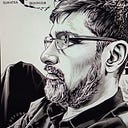Book Review: The Death of Ivan Ilyich
“Yes, there it is. Well, then, let there be pain.
“And death? Where is it?”
He sought his old habitual fear of death and could not find it. Where was it? What death? There was no more fear because there was no more death.
Instead of death there was light.”
― Leo Tolstoy, The Death of Ivan Ilych
The experience of death happens through life; when it actually happens, one has already crossed it. Imagine running a race, the race of life. All the time, our focus — our mind and our eyes, every nerve and sinew, in sleep and waking- is about the finish line.
The finish line is a physical realm, often a rope that separates the race and the after-race. When one runs the race it is always about the finish line, and the moment we cross, there is a feeling of bliss and maybe, a sense of accomplishment. There is no space for physical pain or the memory of crossing the line.
This sense of elation is what makes death surreal, even if it is the physical parting of the life from its body, which afterward is called mortal remains.
The Death of Ivan Ilyich:

Ivan Ilyich, the protagonist of Leo Tolstoy’s great short novel ‘Ivan Ilyich’ suffers immensely in life — first by living, and then through the process of his dying, but when death happens, he experiences the two emotions that he had always missed — love and bliss.
In his last moments, he experiences love, first when his emaciated and bony hand accidentally falls on his son’s head, he looks at his son and realizes that his son has been grasping and kissing his hand. Tears flow out of their eyes, acknowledging the distance and silence between them.
His wife comes and sees his pain — his face shrunk and his mouth opened to an ‘O’, her normally plaited hair and made-up face, now unkempt and her tears unwiped, and a look of despair on her face. ‘He grieved for her.’ writes Tolstoy.
Suddenly, he lets go of the hatred that he has felt towards everybody except Gerasim, his pantry boy, and the pain that was nagging him on his side since his fall disappears. The world of death is really about the realization of what life did not give, yet what remained were love and the bliss that he was desperately trying to discover through the period of his suffering and dying.
Throughout his suffering, Ivan Ilyich craves understanding and love, but the fact that everybody treats his illness as either a taboo or a matter of routine in their lives rankles him. The ignorance and indifference of those surrounding him, including his wife Praskovya Fyodorovna, who comes from an equitable class, and loves him, more on her terms, develops a deep sense of hatred towards his friends, family, and his life as a whole.
From a person, who has always loved escapades to spice up his life to a person who dives deep into work to avoid his nagging wife, the ascent of Ivan Ilyich from a law student to an assistant to the governor and finally, a respected member at the Court of Justice, is typical of a man from those days, who used the social ladder for his purposes. The world seemed to be simple, and society was more responsive to his outlooks and certitudes of life.
All was well, till his fall when trying to arrange the drapings in his new mansion in St. Petersberg. He injures his side. There is that niggle that he ignores, but slowly it grows into intolerable pain. He tries to distract himself with his work and friends, but it grows slowly into a fear of death.
The doctors he meets bring their own deductions of the pain and its cause, but neither their demeanor nor their deductions give relief to the once celebrated judge. Ivan Ilyich tries desperately to fix the problem with multiple means, including homeopathy but fails. The doctor and his wife, blame him for not following the prescription regimen and from there on, treat him as an incorrigible and headstrong man.
Only his servant Gerasim understands him — he, the lad of perfect white teeth and brimming youth, yet with a deep understanding of the pain that Ivan Ilyich is going through and the attention and care that he needs. ‘Why shouldn’t I help you? You are a sick man.’ The simple but powerful words are like milk and honey for the sick and dying man.
A treatise on death:
After ‘Metamorphosis’ by Frank Kafka, ‘The Death of Ivan Ilyich’ by Leo Tolstoy brings about the matters of human suffering in life. Even the injury and suffering of Ivan Ilyich is in a sense metamorphosis, for Ivan’s life changes from the vitality of healthy and normal life, to the triviality of suffering and hatred, but in the end, both Gregor and Ivan wanted to go away, so that their end would bring the curtains down on the sufferings that they have imposed on their near and dear.
Yet, Leo Tolstoy’s character brings out the fear that surrounds death and the pain and suffering of life that prolongs death, in steps. The physical aspects of the degrading body with the submergence of Ivan’s soul into the dark depths of desperation and despondency, and the final moments, where the revelation of love and letting go brings relief to his soul, and the disappearance of the physical pain — all of these weaved together so well and in finesse, reflects the magnitude of Tolstoy’s effort.
The fact that Tolstoy himself went through a crisis of mortality, which is not different from his protagonist makes the story relatable and celebration-worthy.
~Ashok Subramanian
